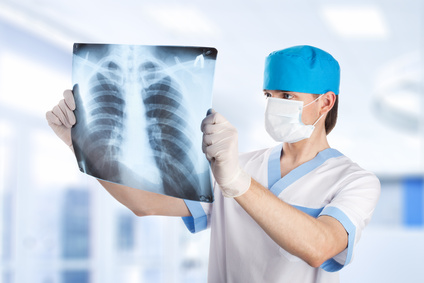Respiratory Career

A Pulmonologist is a physician who specializes in the diagnosis of pulmonary diseases and conditions. Pulmonology is the sub-specialty of internal medicine concerned with
diseases of the lungs and bronchial tubes, which often involves
evaluation of the upper respiratory tract (nose, pharynx and throat)
as well as the heart. After completing high school studies they must graduate medical school with a specialization in lungs, then they must take an exam proving themselves.Graduation from an approved medical school
- Graduation from an approved medical school
- Completion of an ACGME (American Council for Graduate Medical
Education) accredited internal medicine residency program, which takes a
minimum of 3 years
- A minimum of 2 years of meaningful patient contact and responsibility
- Of the 2 years, 20 months must be spent in in-patient services,
ambulatory settings, and in the services of dermatology or neurology
- 4 months may be taken outside the above areas, subject to program director approval
- The level of responsibility for patients must increase with each year of training
Pulmonologist Examination & Certification
After satisfactory completion of graduate education, the physician is
allowed to take the Internal Medicine board certification examination.
After passing the
exam
, the physician receives board certification in internal medicine. This is a prerequisite to becoming certified in pulmonology.
Once board certified in internal medicine, the physician must be trained
in the subspecialty of pulmonary medicine in order to receive
certification in pulmonology.
- See more at: http://www.healthcommunities.com/copd/what-is-pulmonary-specialist.shtml#sthash.6ldyLk5f.dpuf
On average Pulmonologist make $242,000
Approximately 14 percent of pulmonologists practicing in the United States earned $100,000 or less per year, and 35 percent reported earnings of less than $200,000 per year.
http://www.healthcommunities.com/copd/what-is-pulmonary-specialist.shtml
- A
minimum of 2 years of full-time graduate training in pulmonary disease,
including instruction in the basic sciences with emphasis on molecular
biology, pulmonary physiology, and pulmonary immunology
- 12 months of the 2 years must be spent in clinical training in diagnosis and management
- See more at: http://www.healthcommunities.com/copd/what-is-pulmonary-specialist.shtml#sthash.zb7FZX1k.dpuf
- A
minimum of 2 years of full-time graduate training in pulmonary disease,
including instruction in the basic sciences with emphasis on molecular
biology, pulmonary physiology, and pulmonary immunology
- 12 months of the 2 years must be spent in clinical training in diagnosis and management
- See more at: http://www.healthcommunities.com/copd/what-is-pulmonary-specialist.shtml#sthash.zb7FZX1k.dpuf
Graduation from an approved medical school
Completion of an ACGME (American Council for Graduate Medical
Education) accredited internal medicine residency program, which takes a
minimum of 3 years
A minimum of 2 years of meaningful patient contact and responsibility
Of the 2 years, 20 months must be spent in in-patient services,
ambulatory settings, and in the services of dermatology or neurology
4 months may be taken outside the above areas, subject to program director approval
- See more at: http://www.healthcommunities.com/copd/what-is-pulmonary-specialist.shtml#sthash.1BZfYqir.dpuf
Graduation from an approved medical school
Completion of an ACGME (American Council for Graduate Medical
Education) accredited internal medicine residency program, which takes a
minimum of 3 years
A minimum of 2 years of meaningful patient contact and responsibility
Of the 2 years, 20 months must be spent in in-patient services,
ambulatory settings, and in the services of dermatology or neurology
4 months may be taken outside the above areas, subject to program director approval
- See more at: http://www.healthcommunities.com/copd/what-is-pulmonary-specialist.shtml#sthash.1BZfYqir.dpuf
physician who possesses specialized knowledge and skill in the
diagnosis and treatment of pulmonary (lung) conditions and diseases. -
See more at:
http://www.healthcommunities.com/copd/what-is-pulmonary-specialist.shtml#sthash.5J7M8ag9.dpuf
physician who possesses specialized knowledge and skill in the
diagnosis and treatment of pulmonary (lung) conditions and diseases. -
See more at:
http://www.healthcommunities.com/copd/what-is-pulmonary-specialist.shtml#sthash.5J7M8ag9.dpuf
physician who possesses specialized knowledge and skill in the
diagnosis and treatment of pulmonary (lung) conditions and diseases. -
See more at:
http://www.healthcommunities.com/copd/what-is-pulmonary-specialist.shtml#sthash.5J7M8ag9.dpuf



